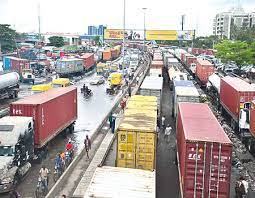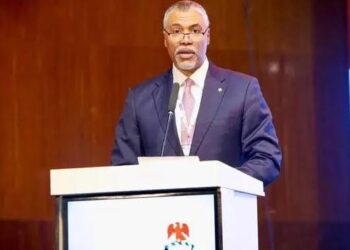
This newspaper reported last week, that even though the Apapa Oshodi expressway reconstruction has been completed, it is still not quite motorable.
Out team of reporters investigated and uncovered that a combination of factors have rendered all efforts and finances that were committed into the project, almost a waste.
Stakeholders in the port city of Apapa who were contacted as well as the motoring public, indeed confirmed that the Mile 2 to Apapa end of the Apapa-Oshodi expressway is completed, but can not be freely accessed enroute Apapa.
They identified a myriad of issues such as, non-operational truck terminals, enforcement failures, and excesses of tanker operators, as major contributors to the road’s present state, despite government’s huge expenditure on its reconstruction.
On account of this, motorists going to the port from the Mile 2 axis are forced to drive against traffic, using the service lanes at intervals where several heaps of dirt as well as indiscriminate parking of trucks on the road still dot the landscape.
Sometime in 2020, at the peak of the collapse of vehicular traffic into and out of the port city of Apapa, the then- Minister of Works and Housing; Mr Babatunde Raji Fashola opined that the lingering gridlock at the Apapa port area requires more than good road network for it to ease.
He pointed out that beyond roads, Nigerians must not lose sight of the fact that the ports which were built over 100 years ago, have been overstretched given the growing population of Nigeria and the facilities at the two Lagos ports.
The Minister was very apt in his observations, having been Governor of the state and now the Minister whose portfolio covers road construction as well.
Apapa is very strategic to the economy of Nigeria, it is linked to the rest of Lagos by two major highways; the Apapa – Oshodi expressway and the Western Avenue (Funso Willaims Avenue). Of course, it can also be approached by water from Mile 2 (on the mainland) and Marina (on the Island).
What is happening in Apapa which made commuting a nightmare is not unexpected, given its privileged location as home to Nigeria’s two foremost ports which are currently being managed by nine terminal operators. Between the two ports (Lagos Port Complex and Tin Can Island Port) more than 65 percent of dry cargoes and about 90 per cent of the nation’s liquid (petroleum products) are handled. This is because it hosts about 45 tank farms (and still counting). These are in addition to the many banks, shipping companies/agencies, licensed customs offices, factories and numerous other businesses that are located in this port city.
The bulk of these tank farms are located on the Tin Can to Mile2 axis of the expressway. This has further worsened the menace of gridlock in that axis. While it is fairer approaching the port from Ijora axis, the same can not be said about Mile 2 to Apapa.
Before the traffic menace enveloped it, Apapa used to be a thriving, attractive and very busy city, with free flowing vehicular and human traffic; this is in addition to other human endeavours that take place there. It is sad that Apapa has now turned to a failed city; a bedlam of chaos and no-go-area for many.
No matter the argument, the presence of petroleum products tank farms has brought untold hardships to residents, owners of businesses, motorists and workers in Apapa.
Due to aging, neglect, and the damaging effects of heavy-duty trucks carrying cargoes to and from the ports, the Apapa-Oshodi Expressway had virtually collapsed.
But, in August 2013, the Goodluck Jonathan administration approved contracts for the reconstruction of Oshodi-Apapa Expressway. The contract was awarded to Julius Berger (Nigeria) Plc, for N15 billion, with a completion period of 15 months.
Part of the construction was actually completed before the administration left office. However, work on the expressway stopped after the 2015 elections.
And in 2017, the Dangote Group made a proposal to the Buhari administration for them to repair the Oshodi-Apapa Expressway and adjoining roads.
The proposal by Dangote include the reconstruction of the road network starting from Creek Road, Liverpool, Tin Can, all through to Marine beach to Mile 2 to Oshodi to Oworonshoki and to the Toll Gate. on the Lagos-Ibadan expreways.
Happily, by July 2018, the then-Buhari administration approved the contract for the reconstruction of the road from Apapa to the toll gate on Lagos-Ibadan expressway in Lagos state.
Despite the full completion of the Mile 2 – Tin-Can port access road in June 2023, it continues to be a source of frustration for those seeking access to Lagos ports.
Sadly, truckers have made a complete mess of the efforts. The inbound lane to the Tin Can port is totally congested with the heavy presence of articulated vehicles, from Mile 2 down to the Tin Can port gate. This fact was corroborated by the Federal Controller of Works in Lagos, Mrs. Olukorede Keisha.
However, even though the road is completed, and opened to traffic on both carriageways, the sad truth is that motorists can not ply this road. This is because there is complete obstruction of traffic flow by petroleum products tankers.
Even though the Controller of Works blamed both the Nigerian Ports Authority and the Lagos State Ministry of Transportation, and by extension the state government, we would rather blame the Federal Government for clogging the Apapa end of the expressway with tank farms, which have overtime become lords unto themselves. Incidentally, the tank farms are localized with the troubled Mile 2 to Tin Can port axis.
There is a complete breakdown of law and order on that stretch of the expressway. State and non-state actors are taken full advantage of the situation. They extort.
Virtually all concerned, especially truckers have shouted about the extortion going on that stretch, yet it continues.
We wonder why all efforts have failed, yet the solution in there. Government should encourage a call-up system for petroleum products tankers, so that only those that are scheduled for loading at the depot will come over to the tank farms. This system is working well for trucks that load cargoes from the port. It can also work for tankers.
We also think that proliferation of transport unions and associations is aiding extortion in the port corridors. These associations are only interested in levies and illegal collections from truckers. To stop extortion, government should also ban collection of levies from drivers and owners of these articulated trucks on the roads. Levies and union dues are to be collected at their offices.














